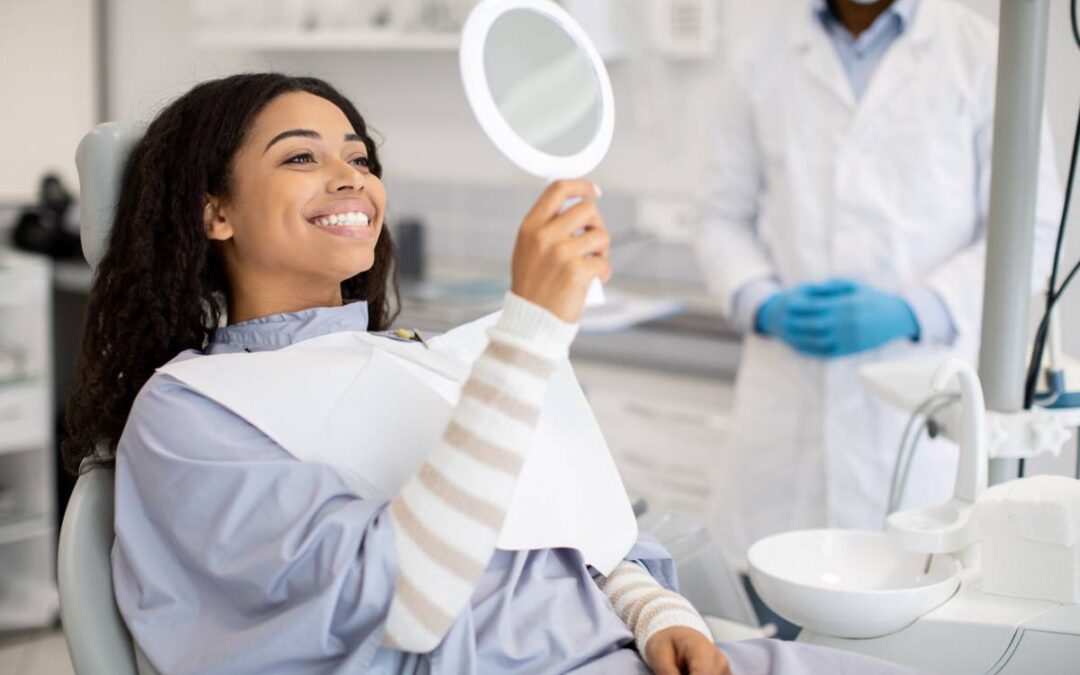Can you whiten dental veneers? Dental veneers are a great solution for people who want to enhance the look of their smile. Apart from aesthetics, veneers can also improve the functionality of your teeth. This dental device can help solve such issues as cracks, chips, gaps, uneven length and size of your teeth, stains, and other imperfections.
Can You Whiten Dental Veneers?
Dental veneers are a permanent solution. However, depending on the material used for the veneers, sooner or later, they might start looking not as perfect and even in color as when they are new. That is why many people ask: can you whiten dental veneers? In this article, we answer these questions and present solutions for discoloration of your dental veneers.
What Are Dental Veneers?
Essentially, dental veneers are custom made shells that are fitted over your teeth to change their appearance in the desired way. Veneers are considered to be an irreversible dental solution because your teeth have to be specially prepared for receiving them. To do so your dentist will remove some of the enamel of the tooth. However, the nerves and roots of the tooth are never affected by this procedure, so the tooth itself stays intact.
Dental veneers can be made of different materials, including porcelain, zirconium, composite, and others. Now porcelain is the material most commonly used for dental veneers.
Why Do Dental Veneers Change Appearance with Time?
Porcelain is a thin material that is strong and durable at the same time. It is also thought to be stain and damage resistant. However, just like any other material and your natural teeth it wears out over time. Also, lifestyle and eating habits may influence the longevity of dental veneers.
There are products that might stain your veneers or cause discoloration:
- Coffee
- Black tea
- Red wine
- Berries
- Foods and drinks containing dyes
- Juices
- Tobacco products
Veneers made from composite tend to be less resistant to stains and discoloration. Thus, if you consume a lot of the products listed above, porcelain veneers might be a better option for you.
Other causes for stains and discoloration of your veneers might include:
- With time the material that bonds veneers with your teeth can get discolored. Dental cement used for bonding is more porous than the porcelain finish of the veneers. This fact means that it is more susceptible to staining. The stains and discoloration of the bonding material can sometimes be visible through the veneer’s surface, giving the impression that the veneer itself is stained.
- Micro scratch and abrasions on the surface of your veneers allows for food particles and bacteria to adhere to the veneer. With time debris and bacteria accumulate, increasing stains and discoloration.
- If your dental veneers are older than 6-8 years, it is not unnatural for them to start showing signs of discoloration. It is an expected and natural process.
Whitening Dental Veneers
Understandably, when dental veneers lose their initial pristine appearance, people start looking into options of whitening their veneers. Unfortunately, homemade or over-the-counter solutions for whitening are not good and not effective for whitening the material dental veneers are made from. Consult your dentist if you notice that stains or discolorations have appeared.
One of the solutions for stained dental veneers is a professional cleaning. It removes some debris and stains from the surface of the veneers and can considerably improve their appearance. During this procedure the porcelain glaze on your veneers can be renewed. However, in cases of severe staining or discoloration, your dentist might advise you to replace your veneers with new ones.
How to Take Care of Veneers to Prevent Discoloration and Stains
Preventing stains and discoloration by taking proper care of the veneers is in many cases easier than removing them when they have already occurred. Try following these rules:
- Avoid staining foods, beverages listed above, and tobacco products. If you do consume these products, brush your teeth right after to prevent the debris and bacteria from accumulating on the surface of your veneers.
- Ask your dentist to recommend you special toothpastes with polishing compounds made for dental veneers. This solution can help prevent staining.
- Maintain overall good oral hygiene. Even if you do not consume staining food or tobacco, you still should brush and floss your teeth twice a day to prevent plaque and bacteria from collecting on your veneers and on your natural teeth.
- Avoid abrasive toothbrushes and toothpastes with baking soda. They are more likely to scratch the surface of your veneer, leaving micro-abrasions on their surface.
- Never use baking soda on your veneers. It will only damage the surface of the veneers and make the stains worse.
If you have any questions about dental veneers left or need a personal consultation, make an appointment at Innovative Smiles LB. One of our qualified specialists will make sure that your veneers are in good condition.


